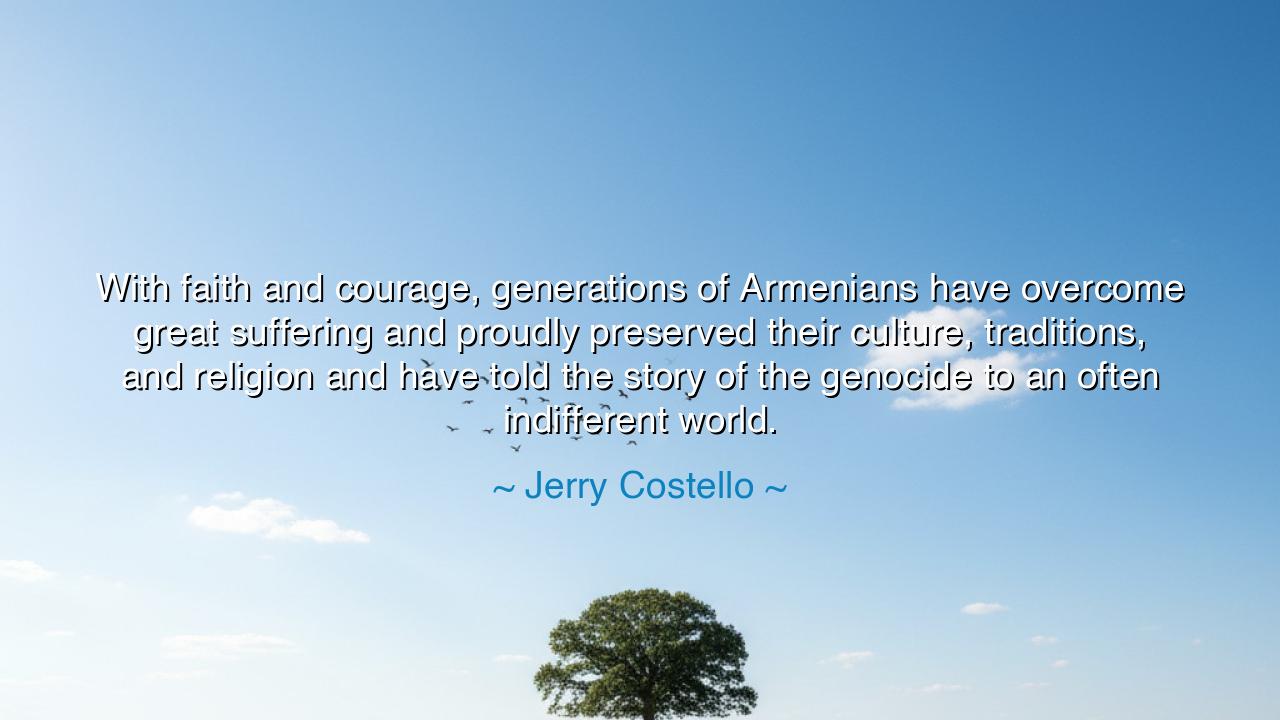
With faith and courage, generations of Armenians have overcome
With faith and courage, generations of Armenians have overcome great suffering and proudly preserved their culture, traditions, and religion and have told the story of the genocide to an often indifferent world.






The American statesman Jerry Costello once said: “With faith and courage, generations of Armenians have overcome great suffering and proudly preserved their culture, traditions, and religion and have told the story of the genocide to an often indifferent world.” In this profound declaration, he honors not only a people, but a spirit—a resilience forged in the crucible of unimaginable pain. These words are not simply about history; they are about the eternal strength of the human soul. They remind us that when cruelty seeks to erase a nation, faith and courage become the twin pillars upon which survival is built.
The meaning of Costello’s words lies in his recognition of a truth as old as time: that the endurance of a people is not written in their armies or their wealth, but in the unbroken thread of their spirit. The Armenians, one of the world’s oldest civilizations, endured the genocide of 1915, when over a million of their people were killed, driven from their homes, and scattered across the world. Yet even in exile and loss, they did not let their identity die. Through song, prayer, and remembrance, they carried their homeland in their hearts. Faith kept them rooted when the earth beneath them was torn away, and courage allowed them to speak their truth even when the world refused to listen.
The origin of this quote comes from Costello’s tribute to the Armenian people and their unwavering strength. As a congressman, he spoke these words to recognize both their suffering and their perseverance—a reminder that history’s wounds, though deep, can also become the soil from which renewal grows. The phrase “an often indifferent world” cuts sharply, for it acknowledges the painful reality that the cries of the oppressed too often fall on deaf ears. Yet the Armenians, rather than succumbing to silence, chose to keep telling their story, generation after generation, transforming grief into remembrance and remembrance into legacy.
To understand the full weight of this quote, one must look to the story of Aurora Mardiganian, a young survivor of the Armenian Genocide. She witnessed the slaughter of her family, endured unspeakable horrors, and yet found the strength to tell her story to the world. In 1918, she starred in a silent film titled Ravished Armenia, based on her own experiences. Her courage turned trauma into testimony, and her voice became a bridge between the voiceless dead and the living world. Aurora’s story reflects the essence of Costello’s words: that courage born of faith can shine light into even the darkest corners of human history.
Through centuries of displacement and hardship, Armenians have preserved their culture, traditions, and religion with sacred devotion. In churches rebuilt from ashes, in songs sung in exile, and in the teaching of their children’s children, they have carried forward what tyranny sought to destroy. The Armenian language still sings; the Armenian cross still stands; the Armenian heart still beats with pride. Their resilience is not passive endurance, but active remembrance—a defiance against oblivion. For as long as their stories are told, those who tried to erase them have failed.
Yet Costello’s words are not only about Armenians; they speak to all who have suffered, to all who carry the burden of injustice. He teaches that faith—not blind belief, but the inner conviction that life is sacred and worth defending—is what keeps a people from despair. And courage—not the absence of fear, but the will to act despite it—is what turns survival into victory. When nations forget, when the world grows cold, it is courage that keeps the flame alive, and faith that gives it purpose.
The lesson of this quote reaches beyond borders and time: to remember is to resist, and to endure is to triumph. Every human soul will face trials, and every generation will know pain. But when we hold fast to faith—in ourselves, in goodness, in justice—and pair it with courage, we become unbreakable. The Armenians teach us that the truest victory is not revenge or conquest, but the preservation of dignity and truth.
And so, let this teaching be passed down: in every heart there lies the power to rise again. When suffering seeks to silence you, speak your truth. When the world turns away, hold fast to your identity. As Jerry Costello reminds us, faith and courage are stronger than any tyrant, any genocide, any indifference. They are the immortal forces that carry the story of humanity forward—unbowed, unforgotten, and free.






AAdministratorAdministrator
Welcome, honored guests. Please leave a comment, we will respond soon